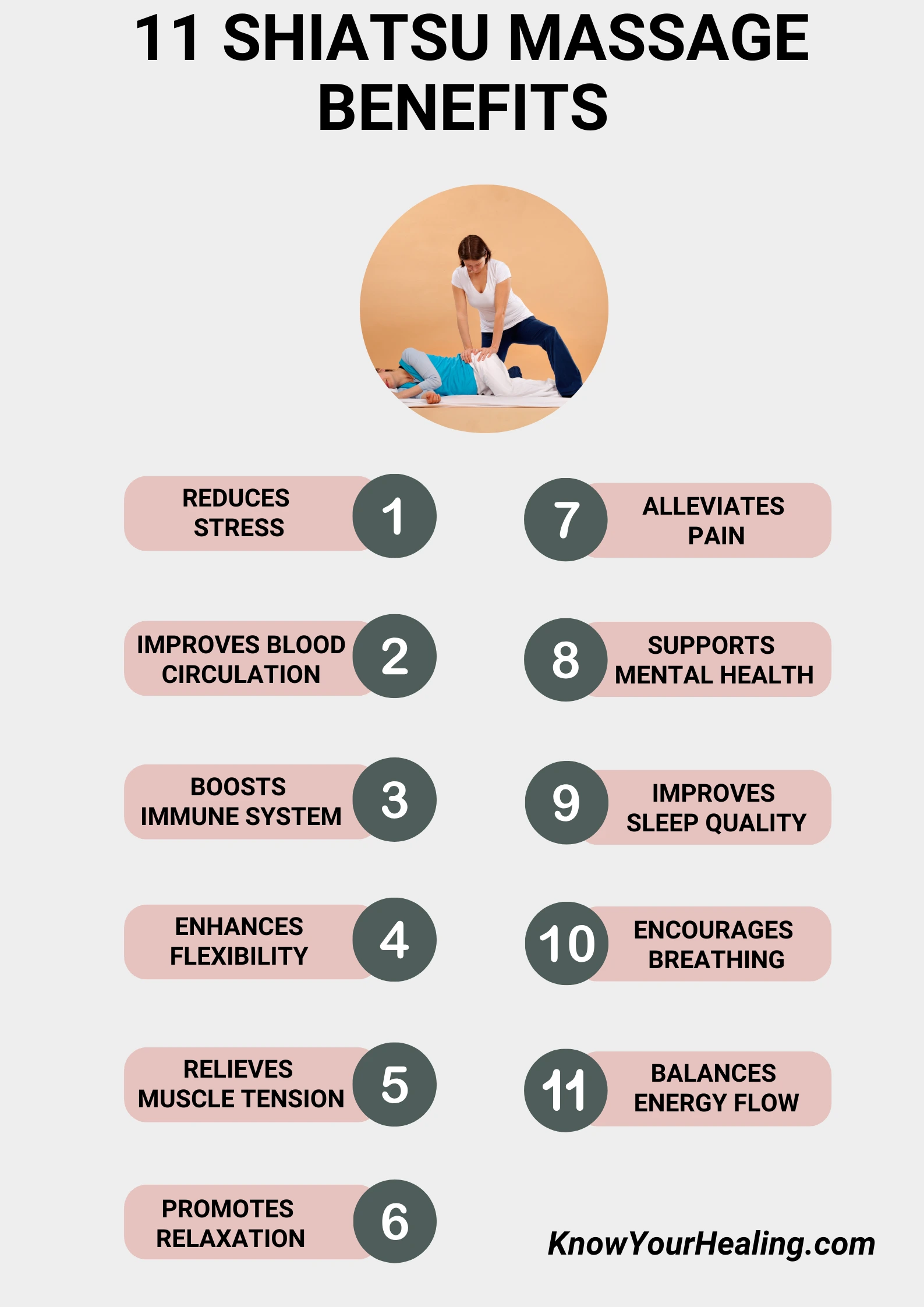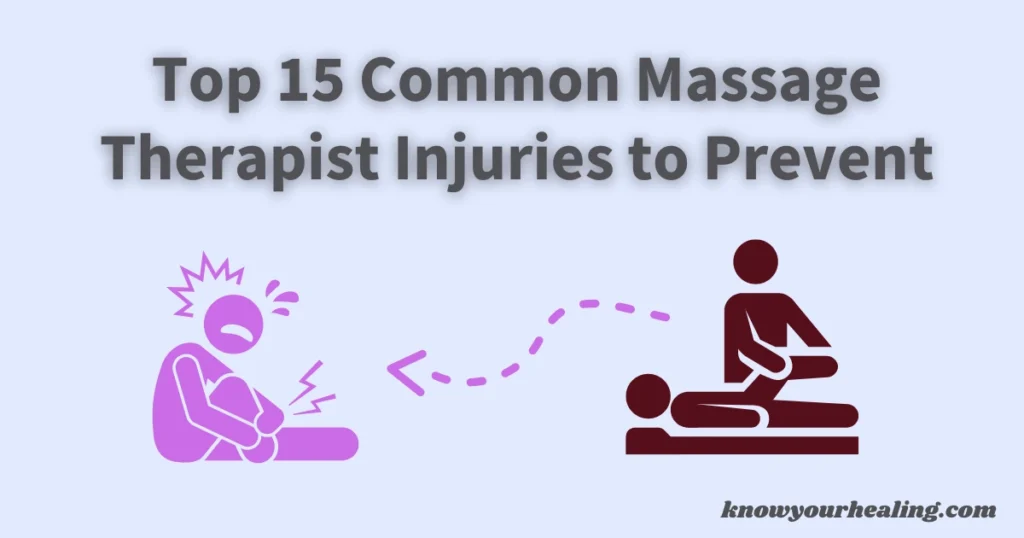Shiatsu massage benefits include its traditional holistic approach to enhancing well-being, making it an effective therapy for those facing issues like stress, muscle pain, and poor circulation. Many people seek Shiatsu to alleviate these problems effectively.
This article explores the benefits of Shiatsu massage, offering insights into how it can improve physical and mental health.
Shiatsu focuses on harmonizing the body’s energy flow and aims to relieve various ailments. The discussion will highlight how this therapy can improve sleep, reduce anxiety, and increase energy levels.
If you are interested in natural and noninvasive therapies, you will find valuable information on how Shiatsu massage might benefit your wellness routine.

Reduces Stress
Shiatsu massage is a powerful tool for stress relief. This Japanese technique uses finger pressure to balance energy flow, easing tension. When the energy, or Qi, flows smoothly, individuals often experience decreased stress.
Research has indicated that shiatsu massage can reduce anxiety by altering energy flows in the body. This massage helps the body manage stress by promoting better energy circulation, which may alleviate mental and physical stress symptoms.
During a shiatsu massage session, therapists apply pressure using their fingers, palms, and sometimes elbows. By targeting specific acupressure points, the treatment fosters relaxation across the body.
This approach helps reduce stress and encourages an overall sense of calm.
Clients often find the environment comfortable and noninvasive while lying on a mat. The absence of oils means no residue is left on the skin, which adds to the relaxing experience.
Regular sessions can have a lasting impact on stress levels. Individuals may achieve improved blood flow by participating in these massages, contributing to long-term stress management. Better circulation supports the body’s natural healing processes, helping to mitigate stress-related conditions.
People who receive regular massages often report feeling more balanced and less stressed. Shiatsu’s holistic nature promotes overall relaxation, making it a favored option for those seeking natural stress relief.
Improves Blood Circulation
The benefits of Shiatsu massage include its ability to improve blood circulation effectively.
Applying pressure to specific points on the body helps stimulate blood flow. The increased circulation helps oxygenate muscles and tissues, promoting healing and reducing stiffness.
This benefit can be beneficial for those who experience chronic muscle pain or tension.
Enhanced blood circulation through Shiatsu helps remove stress-induced hormones. These hormones can accumulate and lead to higher stress levels, so their reduction helps promote a more relaxed state. This also aids in boosting mood and energy levels, contributing to overall well-being.
Shiatsu massage focuses on the body’s meridians or energy pathways. The pressure applied during a session helps release energy blockages and improve circulation throughout the body. This approach is similar to acupressure techniques that aim to promote natural healing.
Injured muscles can also benefit from Shiatsu’s boost in blood flow. Enhanced circulation speeds up recovery by ensuring oxygen and nutrients reach the affected areas. This can be particularly beneficial for athletes or anyone dealing with muscle injuries.
Shiatsu massage significantly reduces chronic pain by helping to maintain healthy blood circulation. Regular sessions can lead to long-term improvements in circulation, thereby supporting overall health and vitality.
Boosts Immune System
Shiatsu massage is known to enhance the body’s natural defense mechanisms. It stimulates the immune system by promoting better blood and lymph circulation, vital for transporting nutrients and removing toxins.
Improved circulation also helps white blood cells move more effectively through the body.
Applying finger pressure along energy pathways can significantly reduce stress levels. Lower stress means less cortisol, a hormone that can suppress immune function. The immune system functions more efficiently with reduced stress, reducing the risk of common illnesses.
Research supports these effects, indicating that shiatsu massage can increase the production of cells that combat infections. Regular sessions may enhance overall vitality, improving resilience against pathogens. People with frequent exposure to stress might find this particularly beneficial.
Moreover, the gentle, rhythmic motions used in shiatsu can increase the production of endorphins. Endorphins, or “feel-good” chemicals, not only promote a sense of well-being but also contribute to boosting immune function.
Hence, shiatsu integrates physical and emotional support, enhancing both body and mind.
Incorporating shiatsu into one’s routine can be a worthwhile consideration for anyone looking to strengthen their immune system. By addressing the flow of energy and promoting relaxation, shiatsu contributes to improved immune health naturally and effectively.
Enhances Flexibility
Shiatsu massage can significantly boost flexibility. Applying pressure to specific points on the body encourages the release of tension in the muscles and connective tissues.
Individuals who regularly receive Shiatsu often experience an increased range of motion. This is partly because the technique focuses on balancing energy pathways in the body, promoting relaxation in tight areas. As muscles relax, joints can move more freely.
Like other integrative therapies, Shiatsu helps enhance flexibility by improving blood circulation. Improved circulation ensures muscles receive adequate oxygen and nutrients, aiding their optimal functioning.
Some people might notice flexibility gains after just a few sessions. These improvements can be particularly beneficial for athletes or those engaged in physical activities, as flexible muscles can increase efficiency and reduce the risk of injuries.
Shiatsu massage benefits include improved alignment and an encouraging harmonious connection between the body’s physical and energetic aspects. As tension is released, posture can improve, further contributing to flexibility.
Unlike more vigorous forms of massage, Shiatsu is gentle and considers the body’s energy flow. By working with the body’s natural rhythms, Shiatsu practitioners can tailor the massage to the individual’s needs.
Given its holistic approach, Shiatsu supports the body’s flexibility and promotes overall well-being. Regular sessions can be a proactive way to maintain physical vitality and prevent stiffness.
Relieves Muscle Tension
Shiatsu massage is known for effectively relieving muscle tension. It uses finger pressure to target specific areas, helping muscles relax. The pressure is firm but gentle, soothing aching muscles and reducing stress.
The technique originates from Japan and focuses on promoting balance in the body. Practitioners apply pressure with their fingers, thumbs, and palms, which helps release muscle knots. This can be particularly beneficial for those who experience stiffness in their shoulders, neck, or back.
Shiatsu massage encourages the flow of energy, known as “Qi” in traditional Chinese medicine. This energy flow is believed to influence the muscular system. By enhancing the movement of Qi, the massage can alleviate physical discomfort and promote relaxation.
For many people, this method can be an alternative to other techniques like deep tissue massage. Unlike deep tissue massage, which focuses on deeper layers of muscle, shiatsu aims for a broader effect on the body’s energy lines. This holistic approach can aid in easing chronic muscle tension without causing additional discomfort.
Regular sessions can help maintain muscle flexibility and prevent further stiffness. For individuals seeking an effective way to manage stress-induced muscle tension, shiatsu can be a valuable part of their wellness routine. It is widely recognized not only for relieving muscle tension but also for enhancing overall body harmony.
Promotes Relaxation
Shiatsu massage is widely recognized for its ability to promote relaxation. This traditional Japanese therapy applies gentle pressure to the body’s meridian points, releasing muscle tension and stress and inducing a calming effect.
The techniques involved in shiatsu help improve energy flow, also known as Qi, throughout the body. This energy balance contributes to a more relaxed state, both physically and mentally.
The deep sense of tranquility achieved through this practice can be particularly beneficial for those dealing with anxiety or high-stress levels.
By targeting specific points, shiatsu massage also aids in calming the nervous system. This relaxation response not only soothes the mind but also promotes overall well-being.
Many find that shiatsu’s soothing nature contributes to better sleep. Reduced stress levels and improved energy flow can help the body transition more easily into restful sleep. As a result, individuals often feel refreshed and energized after regular sessions.
Consider reading the Bodhi Holistic Hub’s guide for more detailed insights into how shiatsu can enhance relaxation. The guide explores various techniques that harness the power of shiatsu for stress relief.
Alleviates Pain
Shiatsu massage can be a powerful tool for easing pain. Known for its therapeutic properties, it focuses on applying finger pressure to specific points on the body. This helps relieve tension in muscles and joints, making it practical for various types of pain.
By targeting pressure points, Shiatsu enhances the flow of energy, or Qi, which is believed to be the life force in traditional Chinese medicine. The technique can reduce discomfort associated with headaches and neck and back pain.
Massage therapy not only addresses acute pain but also supports those with chronic pain conditions. Techniques involving the hands and fingers help release muscle tightness, reduce stiffness, and improve mobility, making it beneficial for those suffering from long-term pain issues.
Improved blood circulation is another benefit of Shiatsu, aiding in pain relief. By enhancing circulation, the massage increases oxygen and nutrient delivery to tissues, promoting healing and reducing inflammation.
Many find shiatsu helpful with conditions like arthritis. The pressure stimulates nerve endings, which can block pain signals to the brain. This natural approach is appealing to people seeking alternatives to medication.
Shiatsu’s holistic nature also promotes relaxation and stress reduction, which can further alleviate pain. The calming effect on the mind and body contributes to overall well-being, making it a beneficial practice for those seeking comprehensive pain management.
Supports Mental Health
Shiatsu massage offers several benefits for mental health. Focusing on acupressure points helps alleviate stress, a common mental health issue.
This massage technique promotes relaxation and calmness, aiding those dealing with anxiety and tension.
The practice involves gentle pressure applied with the fingers, which encourages a sense of connection and comfort. This tactile interaction can significantly enhance mood by releasing endorphins, the body’s natural feel-good chemicals. As a result, individuals often experience improved emotional well-being.
Additionally, shiatsu encourages deep breathing and mindfulness during sessions. These elements are central to reducing the symptoms of depression and anxiety.
Clients often find themselves more centered and peaceful by focusing on breath and present moment awareness.
Research indicates that massage therapies, including shiatsu, can positively impact those experiencing mental health challenges. For instance, it can help improve the quality of sleep, which is vital for emotional stability. Sleep disturbances are a known contributor to mental health issues.
Shiatsu massage benefits extend beyond temporary relief, fostering long-term mental health improvements. Regular sessions encourage a balanced lifestyle, cultivating resilience against stress and emotional upheavals.
Shiatsu also supports the body’s natural energy flow, promoting harmony between mind and body. Incorporating shiatsu into regular self-care routines may enhance mental clarity and focus.
This holistic approach supports overall mental health by targeting physical and emotional aspects, providing a comprehensive therapeutic experience.
Improves Sleep Quality
Shiatsu massage is known to help enhance sleep quality. It involves applying gentle pressure to specific points on the body, which helps release muscle tension and promote relaxation. This relaxation can make falling asleep more manageable and help you enjoy a deeper sleep.
Several studies and reports, including one from the Massage Therapy Journal, have suggested that incorporating shiatsu with standard therapy can improve sleep quality.
This is especially beneficial for those suffering from insomnia or experiencing overall sleep disturbances, as it aims to balance the body’s energy, often referred to as Qi or chi.
Another study highlighted by Better Sleep Simplified discussed the use of hand self-shiatsu for individuals with chronic pain. This pilot study found that this practice may assist with sleep-related issues.
Shiatsu potentially leads to better sleep patterns by reducing pain and enhancing relaxation. Regular shiatsu sessions can be a natural alternative for those looking to improve their sleep without medication.
Incorporating this therapy into a routine might provide long-term benefits for sleep quality and overall well-being.
The technique’s focus on balancing energy pathways in the body helps regulate the sleep cycle, making it an effective method for improving rest.
Shiatsu is also accessible and tailored to individual needs, making it a versatile option for anyone seeking improved sleep.
Encourages Relaxed Breathing
Shiatsu massage can enhance breathing by easing tension in the chest and diaphragm. During a session, the practitioner applies pressure to specific points on the body.
This can help release tightness and allow for deeper, more relaxed breaths. As a result, the massage may contribute to improving respiratory function.
The calming effect of shiatsu massage on the nervous system plays a significant role in encouraging relaxed breathing.
Promoting a shift from the body’s fight-or-flight mode to a state of calmness reduces stress and creates a more peaceful environment in which breathing can become more manageable. This can be especially beneficial for those dealing with anxiety or stress-related breathing difficulties.
Incorporating techniques focusing on the upper body, shiatsu massage targets critical areas that affect breathing. The massage can alleviate muscular tension and improve circulation by addressing these points. This process not only helps with relaxation but also improves the oxygen supply to the body.
When individuals experience enhanced shiatsu massage benefits, such as relaxed breathing, they often find it easier to engage in deep breathing exercises. This can further support a sense of well-being and overall relaxation.
Balances Energy Flow
Shiatsu massage is known for balancing the body’s energy flow. This ancient Japanese technique uses pressure on specific points to enhance the natural movement of energy, known as Qi.
By targeting these points along the body’s meridian lines, flow is restored, which helps maintain physical and emotional well-being. Practitioners apply pressure using their fingers, thumbs, palms, and sometimes elbows and knees.
This technique can unblock energy and improve circulation. It promotes a sense of harmony in the body and mind, reducing stress and tension.
Balancing energy flow is a foundational aspect of shiatsu massage benefits. Clients often describe feeling more relaxed and rejuvenated after a session. This balance can also lead to better sleep patterns and enhanced overall vitality.
Shiatsu massage can address various health conditions, encouraging the body’s natural healing process. By harmonizing energy, the body functions more efficiently, which can help relieve chronic pain and improve mood.
The practice is not just about physical relaxation. It also provides emotional and spiritual benefits. A balanced energy flow connects the body’s systems, supporting holistic health and reducing feelings of anxiety or stress.
For those interested in experiencing these effects, shiatsu offers a unique approach to enhancing wellness naturally and effectively.
Understanding Shiatsu Massage
Shiatsu massage is a traditional Japanese therapy that uses finger and palm pressure to balance the body’s energy. This section will discuss its historical roots and foundational principles.
History and Origins
Shiatsu has ancient roots in Japan. It gained recognition as a formal therapy in the early 20th century. Its techniques are influenced by traditional Chinese medicine, which includes acupressure and massage practices.
Shiatsu became more prominent when Tokujiro Namikoshi developed a systematic approach in 1912. He founded the Japan Shiatsu College in 1940, further promoting its acceptance.
Today, shiatsu is practiced globally and is appreciated for its holistic nature.
It continues to evolve while maintaining its traditional essence, offering numerous shiatsu massage benefits such as relaxation and energy balance.
Principles of Shiatsu
Shiatsu focuses on restoring energy flow, known as “Qi” in Chinese philosophy.
Practitioners believe an imbalance in Qi can cause health issues. Shiatsu involves applying rhythmic pressure on specific body points using fingers, palms, or thumbs.
This method enhances circulation, reduces stress, and promotes healing.
Unlike other massages, shiatsu does not generally use oils, so it is often performed through loose clothing, such as in traditional settings like Shiatsu massage.
These principles emphasize holistic well-being, addressing physical, mental, and emotional aspects.
Shiatsu aims to boost overall health and provide a calming experience by improving energy flow, appealing to those seeking natural, supportive treatments.
What is a Shiatsu Massage Good For?
Shiatsu massage is beneficial for a variety of health and wellness concerns. It originated in Japan and draws from traditional techniques emphasizing balancing the body’s energy, known as qi or chi. This massage practice is not only relaxing but also enhances overall well-being.
One of the primary shiatsu massage benefits is reducing stress. By applying pressure to specific points on the body, shiatsu can decrease tension and promote relaxation.
Many people find it helpful in alleviating symptoms of stress-related conditions such as anxiety and insomnia.
Shiatsu is also effective for pain relief. It is often used to treat issues like chronic back pain and headaches. The pressure applied during the massage improves circulation, which can help reduce discomfort and encourage healing.
Additionally, this massage technique supports better digestion.
Focusing on the body’s meridians can enhance digestive health and relieve symptoms such as bloating and constipation, making it a popular choice for those with digestive concerns.
Another advantage is improved flexibility and posture.
Through gentle stretching and manipulation, shiatsu promotes better joint mobility. This can be particularly beneficial for individuals recovering from injuries or those aiming to prevent musculoskeletal problems.
Finally, shiatsu massage bolsters the immune system.
Stimulating the flow of qi is believed to enhance the body’s natural defenses and reduce the frequency and severity of illnesses.
What are the cons of Shiatsu?
Shiatsu massage can have several drawbacks, which users should consider before choosing this therapy.
Shiatsu should not replace medical treatment for serious health issues. While it offers pain relief and stress reduction, those with conditions like heart disease or severe skin disorders should seek medical advice first.
The physical nature of Shiatsu might lead to discomfort for some.
Since it involves pressure on various body parts, sensitive individuals might experience bruising or soreness following a session. This can be particularly concerning for those with lower pain tolerance.
Insurance plans do not always cover these sessions. Because Shiatsu is considered an alternative therapy, many health insurance policies do not include it in their coverage.
This can make regular sessions a costly investment. However, for those who benefit, the improved circulation and stress relief may outweigh these costs.
Individuals who are pregnant or have certain health conditions should exercise caution. Shiatsu targets specific pressure points, which might not be suitable for everyone. Pregnant individuals should consult with their healthcare provider before undergoing Shiatsu.
Individuals with joint or bone issues must be cautious.
The body’s manipulation and stretching during a session might aggravate certain conditions. Prior consultation with a healthcare professional can help mitigate this risk and ensure that Shiatsu meets their health needs.
How often should you do a Shiatsu massage?
Shiatsu massage is a practice that can be tailored to individual needs. It is often recommended for maintaining optimal health and balance.
Individuals may consider receiving a shiatsu massage once a month for consistent benefits and energy balance.
More frequent sessions may be appropriate for those seeking stress relief and relaxation. Weekly or bi-weekly appointments can enhance the benefits of shiatsu massage, such as reducing anxiety and elevating mood.
People experiencing specific health issues or tension may opt for a more personalized schedule. Consulting with a therapist will help determine the ideal frequency in these cases.
Regular communication ensures that the massage meets their therapeutic needs without causing discomfort.
Shiatsu uses finger pressure to release tension and improve balance in the body’s energy pathways. Whether someone seeks regular massages for wellness or specific health benefits, adjusting the frequency to individual comfort and goals is vital to maximizing the positive effects.
Final Thoughts
Shiatsu massage benefits are numerous and varied. This traditional Japanese technique focuses on applying pressure along specific points on the body, improving physical and mental health.
People often turn to Shiatsu for its ability to ease stress and promote relaxation.
Key Benefits:
- Stress Reduction: Shiatsu is known for helping to alleviate stress by improving circulation and balancing energy levels.
- Pain Relief: Many experience reduced muscle tension and pain after a session.
- Improved Sleep: Enhanced relaxation may lead to better sleep quality.
Practitioners believe that Shiatsu enhances energy flow, or “Qi,” helping the body heal itself more effectively.
When considering Shiatsu, it’s essential to ensure the therapist is trained and experienced. It can effectively treat those seeking natural relief from tension and stress.




